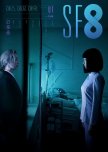Enigmatic, disconcerting and disquieting, this first story in the new SF8 anthology is something I never thought I would see from Korea - pure science fiction.
And like the best of science fiction, its job is to make us think and make us feel - even if those feelings are uncomfortable and make us question everything.
In a future where medicine is keeping people alive long after they would normally have passed, caregiver robots have been created that look like the patients' loved ones. As nursing hospitals replace schools and people go into debt to buy the expensive caregivers, the show examines the lives of two families each able to provide only palliative care to an ill member of their family.
Like most robot stories, The Prayer isn't about futuristic palliative care or even about robotics. It is instead about the nature of humanity. Grounded in the story of Cain and Abel and the question, "Am I my brother's keeper?", it asks some big questions about what it means to care for somebody and the limits and boundaries of that responsibility.
Lee Yoo-young is transcendent here playing dual roles as Yeon Jung-in and her robot double Gan Ho-jung. Jung-in is struggling with middle age questions of failure and purpose as her mother lies in a vegetative state with her doppelganger Ho-jung looking over her. But Ho-jung has also been programmed to care forJung-in and after a possible system error she decides that looking after the daughter requires the death of the mother.
Is Ho-jung suffering from a logic failure or an emotional awakening? Is she malfunctioning or gaining sapience? Can she feel and if she can are those feelings something she should act on? Is her desire to care for Jung-in a selfless act of consideration or has she developed the ability to lie even to herself?
Like the best of science fiction, The Prayer never answers these questions. Dark, off-kilter, often out of focus and kaleidoscopic, The Prayer simply asks. It is up to us to decide if we can answer.
And like the best of science fiction, its job is to make us think and make us feel - even if those feelings are uncomfortable and make us question everything.
In a future where medicine is keeping people alive long after they would normally have passed, caregiver robots have been created that look like the patients' loved ones. As nursing hospitals replace schools and people go into debt to buy the expensive caregivers, the show examines the lives of two families each able to provide only palliative care to an ill member of their family.
Like most robot stories, The Prayer isn't about futuristic palliative care or even about robotics. It is instead about the nature of humanity. Grounded in the story of Cain and Abel and the question, "Am I my brother's keeper?", it asks some big questions about what it means to care for somebody and the limits and boundaries of that responsibility.
Lee Yoo-young is transcendent here playing dual roles as Yeon Jung-in and her robot double Gan Ho-jung. Jung-in is struggling with middle age questions of failure and purpose as her mother lies in a vegetative state with her doppelganger Ho-jung looking over her. But Ho-jung has also been programmed to care forJung-in and after a possible system error she decides that looking after the daughter requires the death of the mother.
Is Ho-jung suffering from a logic failure or an emotional awakening? Is she malfunctioning or gaining sapience? Can she feel and if she can are those feelings something she should act on? Is her desire to care for Jung-in a selfless act of consideration or has she developed the ability to lie even to herself?
Like the best of science fiction, The Prayer never answers these questions. Dark, off-kilter, often out of focus and kaleidoscopic, The Prayer simply asks. It is up to us to decide if we can answer.
¿Te ha parecido útil esta reseña?

 1
1


















